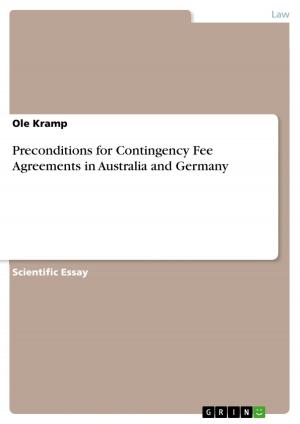Economics of criminology
The relevance of economic theories in criminology and the efficient reduction of crime
Nonfiction, Social & Cultural Studies, Social Science, Crimes & Criminals, Criminology| Author: | Val Kauth | ISBN: | 9783640167074 |
| Publisher: | GRIN Publishing | Publication: | September 16, 2008 |
| Imprint: | GRIN Publishing | Language: | English |
| Author: | Val Kauth |
| ISBN: | 9783640167074 |
| Publisher: | GRIN Publishing |
| Publication: | September 16, 2008 |
| Imprint: | GRIN Publishing |
| Language: | English |
Scientific Essay from the year 2007 in the subject Sociology - Law, Delinquency, Abnormal Behavior, grade: A, Loughborough University (United Kingdom Loughborough University), course: Economics of Criminology , 16 entries in the bibliography, language: English, abstract: Criminality is and has always been an urgent issue for the society. Its magnitude has been rising dramatically in many western countries. Since 1946, crime rates in Britain have increased by the factor 10 and nowadays about 25% to 30% of the OECD-citizens are victimised each year. Together with criminality, public expenditure for the Criminal Justice System (CJS) has been rising sharply. In order to achieve one of the declared main purposes of the CJS, 'to reduce crime and the fear of crime and their social and economic costs', theories of crime are an important contribution of the sciences. Accordingly, they are an important subject in many scientific fields: Psychology, Sociology and the Economic Sciences offer a large variety of different theories to explain the diverse aspects of criminality. The following text will discuss how and to what extend theories of crime and in particular economic theories of crime can help to reduce crime and the fear of crime. In the process, first the economic and social cost- dimensions of crime will be elucidated. Then, crime theories and in particular Becker's theory as the pioneering work of economic criminology will be introduced. Eventually, a critical view on theories of crime and the economic approach as well as an analysis of its distinctive advantages will be elaborated.
Scientific Essay from the year 2007 in the subject Sociology - Law, Delinquency, Abnormal Behavior, grade: A, Loughborough University (United Kingdom Loughborough University), course: Economics of Criminology , 16 entries in the bibliography, language: English, abstract: Criminality is and has always been an urgent issue for the society. Its magnitude has been rising dramatically in many western countries. Since 1946, crime rates in Britain have increased by the factor 10 and nowadays about 25% to 30% of the OECD-citizens are victimised each year. Together with criminality, public expenditure for the Criminal Justice System (CJS) has been rising sharply. In order to achieve one of the declared main purposes of the CJS, 'to reduce crime and the fear of crime and their social and economic costs', theories of crime are an important contribution of the sciences. Accordingly, they are an important subject in many scientific fields: Psychology, Sociology and the Economic Sciences offer a large variety of different theories to explain the diverse aspects of criminality. The following text will discuss how and to what extend theories of crime and in particular economic theories of crime can help to reduce crime and the fear of crime. In the process, first the economic and social cost- dimensions of crime will be elucidated. Then, crime theories and in particular Becker's theory as the pioneering work of economic criminology will be introduced. Eventually, a critical view on theories of crime and the economic approach as well as an analysis of its distinctive advantages will be elaborated.















